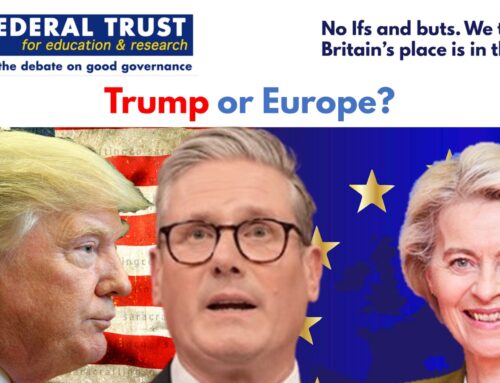
by Roger Casale
Founder and Secretary-General, New Europeans
13th March 2020
If and when the UK re-joins the EU, it will do so not just for transactional reasons but because British people have understood that they are indeed Europeans.
One of the major shortcomings of the remain campaign was the failure to communicate that the EU is not just a single market, but also a community of values.
Strangely the leave camp seemed to understand this much better than pro-Europeans.
When asked if it would matter if UK GDP were to fall as a result of Brexit, Nigel Farage famously answered: “Some things are more important than money.”
Brexit became a triumph of identity politics over common sense because nobody was prepared to make the case that Britain should stay in Europe “because we are Europeans.”
This claim is amply borne out by the saliency of migration as an issue in the referendum campaign.
Since the financial crash of 2008, progressives have struggled to frame an immigration policy that would be true to its values and popular with the electorate.
The Labour Party’s failure to make the case for free movement put it to shame and was one of the reasons I left the Labour Party in 2017.
EU nationals were not to blame for the fact that Britain voted to leave. But a lack of political vision and leadership on the issue of migration fatally undermined the case to remain.
The roots of this failure go back generations and continue to shape not just UK politics and culture but also the language of debate in the UK around migration.
Britain was the only EU member state which referred to transnational Europeans as “migrants”. Unless, of course, those transnational EU citizens were Britons moving to Europe in which case they were known as “expats”.
The 3.6m nationals of other EU member states living in the UK do not think of themselves as migrants. They know they are EU citizens and rightly bemoan their loss of status in the UK.
Four years on from the referendum, the term EU citizens has come to be better understood in Britain and certainly enjoys a wider currency than it did previously.
It is hard to find a stronger pro-EU movement in Europe today than the sprawling, messy and inspirational grassroots for Europe movement that now exists in the UK.
The focus of campaigning is shifting from the common sense, economic argument for staying in the single market to a more emotional appeal to the idea of European citizenship.
This reflects a deeper underlying shift in the UK about how we think about Europe – deeper than just being a case of “not knowing what you have until it’s gone”.
The radical right may want to take the UK not just out of the EU but also the European Convention on Human Rights and the Council of Europe.
It is hard to imagine anything that could do more to fuel a stronger, more positive identification with Europe and the shared values that make Europe what it is.
“Getting Brexit done” has not just meant “respecting the result of the 2016 referendum”. It has also led to a wholesale assault on democracy, human rights and the rule of law.
Take for example the illegal prorogation of parliament, or the systematic denial of a vote in the EU elections of 2019 to up to 1.7 m eligible voters.
Don’t UK citizens have the right to know whether a foreign state has interfered with democracy and therefore to expect the immediate publication of the Russia report?
When we talk about European citizenship, we are not just referring to free movement and the right to vote and stand in local elections, important as these are.
The identification is not with a set of institutions but with a set of values – the values of democracy, the rule of law and human rights.
Membership of the European Union was the best guarantee of those values the UK had. It is also, therefore, the main reason that right wing populists despise the institution.
For years, Euro-sceptics in the UK have hidden the fact that they do not share core European values, by focusing their attack not on those values but on EU institutions.
Pro-Europeans have tried to defend the institutions for pragmatic reasons rather than as the bastion of European identity and values.
In Britain, we lost the fight for our European institutions and we are now in danger of losing the fight to defend our European values.
Across the EU, the “battle for Europe” is not about “sovereignty” or whether or not the EU should become a super-state.
How can anyone seriously suggest, as Boris Johnson frequently does, that the EU is on its way to becoming a super-state, when the main topic of debate at the first EU Council meeting post Brexit was about what fraction of a percent above the current 1% of GDP the EU budget should be allowed to increase by over the next 7 years?
The future of Europe will depend not on the size of the EU budget or the relative weight of supra-national or inter-governmental elements in EU decision-making, but rather on the extent to which EU member states behave in accordance with European values.
What that means is that Poland must be brought to task for taking disciplinary action against judges who uphold the rule of law by respecting the decision of the Court of Justice.
It means Greece should not be left alone to deal with refugees from Turkey but also that Greece must uphold international refugee law in the name of Europe.
It means that the killers of Daphne Caruana Galizia as well as Ján Kuciak and his fiancée should not escape with impunity, even if this means tough action against EU member states.
EU citizens value the EU not just because of peace and prosperity but because the EU has become the go-to institution when national government go rogue.
If ever there was a time when the UK was in need of an insurance policy to guarantee democratic norms, human rights and the rule of law, it is now.
If the UK government continues to abuse its power, demands for Britain to re-join the EU must grow stronger.
We identify as Europeans because we are democrats.
And we are democrats because we are Europeans.





